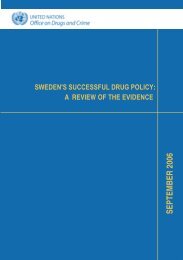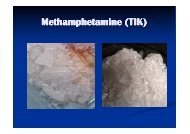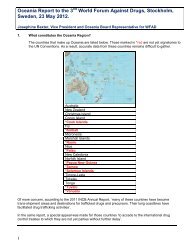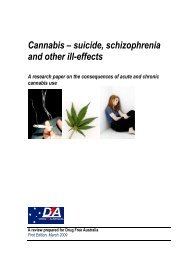- Page 1 and 2: A Compendium of Conference Papers T
- Page 3 and 4: Contents Page Presentations Message
- Page 6 and 7: Dr Ivan Van Damme Flemish Platform
- Page 10 and 11: Risk factors: Isolation Early drug
- Page 12 and 13: -If drug use is common in the home.
- Page 14 and 15: esponsible for the increased rates
- Page 16 and 17: Buried deep within the brain lies t
- Page 18 and 19: Initially, drugs dramatically affec
- Page 20 and 21: the motivational and rewarding effe
- Page 22 and 23: einforcer is a stimulus that streng
- Page 24 and 25: 3 general principles in the reorgan
- Page 26 and 27: of increasing concentrations of the
- Page 28 and 29: attempts to avoid anxiety and fear
- Page 30 and 31: always disappear, leaving the addic
- Page 32 and 33: Repeated drug use causes gradual re
- Page 34 and 35: own feelings or intuition. Young ch
- Page 36 and 37: Cannabis cultivation requires a lot
- Page 38 and 39: memory also can’t be stored in lo
- Page 40 and 41: Long-term cocaine use causes profou
- Page 42 and 43: Alcohol increases the inhibitory ac
- Page 44 and 45: are not relaxed or happy with their
- Page 46 and 47: Elements of Patho- physiology of Dr
- Page 48 and 49: Addiction is a Relationship Problem
- Page 50 and 51: The Role of Genetics in Addiction:
- Page 52 and 53: All Addictive Drugs Interfere With
- Page 54 and 55: Conditioning: • Conditioning proc
- Page 56 and 57: The Addict Side of the Individual:
- Page 58 and 59:
The Cycle of Addiction: • Emotion
- Page 60 and 61:
Addiction is Progressive: Stage Thr
- Page 62 and 63:
Addictive Parents Abuse Their Child
- Page 64 and 65:
Suppose every member of society use
- Page 66 and 67:
1 THE EFFECTIVENESS OF NEEDLE EXCHA
- Page 68 and 69:
3 government, we also wanted to com
- Page 70 and 71:
The effectiveness of needle exchang
- Page 72 and 73:
The Swedish example • In 1985 HIV
- Page 74 and 75:
The Remand Prison Study • In 1987
- Page 76 and 77:
The Remand Prison Study, conclusion
- Page 78 and 79:
NEP - RCT • No significant differ
- Page 80 and 81:
Cont. Study Population Eff. on inc.
- Page 82 and 83:
Incidence & prevalence studies •
- Page 84 and 85:
Incidence of HIV among IDU Scandina
- Page 86 and 87:
Hurley et al. 1997 I Incidence & pr
- Page 88 and 89:
Comments on Wodak et al report •
- Page 90 and 91:
Gary Christian ADRA, NSW, Australia
- Page 92 and 93:
Justification In May 1999 the NSW G
- Page 94 and 95:
Injecting Room Timeline Heroin drou
- Page 96:
DFA Analysis Team • Dr Joe Santam
- Page 99 and 100:
Was the Public Misled • “In the
- Page 101 and 102:
Was the Public Misled • “To dat
- Page 103 and 104:
Was the Public Misled • Agreement
- Page 105 and 106:
10 crucial things you need to know
- Page 107 and 108:
10 crucial things you need to know
- Page 109 and 110:
Street Overdoses • 431 overdose a
- Page 111 and 112:
10 crucial things you need to know
- Page 113 and 114:
10 crucial things you need to know
- Page 115 and 116:
Lives Saved ‘saved between 6 and
- Page 117 and 118:
Injecting Room • Less than 35,000
- Page 119 and 120:
10 crucial things you need to know
- Page 121 and 122:
Syringe Distribution & Counts
- Page 123 and 124:
Honey-pot Effect • “The police
- Page 125 and 126:
Honey-pot Effect • “The train s
- Page 127 and 128:
10 crucial things you need to know
- Page 129 and 130:
Scorecard
- Page 131 and 132:
The End in Sight • “Damien died
- Page 133 and 134:
1 DRUG ABUSE AND MODERN SCIENTIFIC
- Page 135 and 136:
3 in lay and scientific journals an
- Page 137 and 138:
5 Slide 7. Methodology Methodology
- Page 139 and 140:
7 effective intervention in the gro
- Page 141 and 142:
9 The study entailed a comparison o
- Page 143 and 144:
11 factors and vested interests of
- Page 145 and 146:
The Publication of Papers • Peer
- Page 147 and 148:
Methodology Methodology includes: 1
- Page 149 and 150:
"After reviewing all of the researc
- Page 151 and 152:
Ecological Studies Studies of popul
- Page 153 and 154:
Ecological Fallacy • Inferring th
- Page 155 and 156:
Bronwen Healy Hope Foundation, QLD,
- Page 157:
ADDICTION AND RECOVERY Bronwen Heal
- Page 164 and 165:
Jade Lewis Western Australia, Austr
- Page 166 and 167:
Wendy Herbert Fellow Drug Free Aust
- Page 168 and 169:
Trevor Grice Educationalist, Counse
- Page 170 and 171:
Jay R Bacik CEO, Life Education Aus
- Page 172 and 173:
Frans Koopmans Netherlands Session
- Page 174 and 175:
Going Dutch... 1. Introduction 2. D
- Page 176 and 177:
Going Dutch... • 10th century: Fr
- Page 178 and 179:
Going Dutch... • 1960’s: revolu
- Page 180 and 181:
Going Dutch... • Population: conc
- Page 182 and 183:
Going Dutch... ‘Gedogen’ ctd
- Page 184 and 185:
Going Dutch... History Dutch coffee
- Page 186 and 187:
Going Dutch... Local municipalities
- Page 188 and 189:
Going Dutch... Statistics • Turno
- Page 190 and 191:
Going Dutch... © National Drugs Mo
- Page 192 and 193:
Going Dutch... © National Drugs Mo
- Page 194 and 195:
Going Dutch... © National Drugs Mo
- Page 196 and 197:
Going Dutch... © National Drugs Mo
- Page 198 and 199:
Going Dutch... Cannabis policy (197
- Page 200 and 201:
Going Dutch... Drug policy • Prod
- Page 202 and 203:
David Evans Biography David Evans i
- Page 204 and 205:
DRUG FREE AUSTRALIA Voluntary Rand
- Page 206 and 207:
Why Test • Need to improve level
- Page 208 and 209:
For Testing (at Abbey School) • 8
- Page 210 and 211:
Statistics re Abbey School • Abou
- Page 212 and 213:
Interest • Media • UK • Europ
- Page 214 and 215:
VRDT Guidelines Extracts (provision
- Page 216 and 217:
Finally Voluntary Random Drug Testi
- Page 218 and 219:
Dr Gregory Pike Biography Dr Greg P
- Page 220 and 221:
Darren Marton Biography and Abstrac
- Page 222 and 223:
Law Enforcement - the Swedish Model
- Page 224 and 225:
How to identify drug abusers On 1 J
- Page 226 and 227:
The social services may divulge inf
- Page 232 and 233:
Peter Drennan Assistant Federal Pol
- Page 234 and 235:
IN CONFIDENCE Law enforcement can u
- Page 236 and 237:
IN CONFIDENCE The ongoing implement
- Page 238 and 239:
IN CONFIDENCE What do all these sei
- Page 240 and 241:
IN CONFIDENCE In recognition of thi
- Page 242 and 243:
Slide 1 I would like to thank the o
- Page 244 and 245:
Slide 9 It is also worth noting the
- Page 246 and 247:
Slide 16 The average age at when pe
- Page 248 and 249:
Slide 24 I know there is still some
- Page 250 and 251:
Mandate and functions of the Intern
- Page 252 and 253:
Dialogue with Governments ‣ Corre
- Page 254 and 255:
INCB Annual Report The annual repor
- Page 256 and 257:
Internationally controlled drugs an
- Page 258 and 259:
‣ Further deterioration in the dr
- Page 260 and 261:
Analysis of the world situation (3)
- Page 262 and 263:
Afghanistan “Licit poppy proposal
- Page 264 and 265:
Hon Christopher Pyne Minister for A
- Page 266 and 267:
The 2006 World Drug Report estimate
- Page 268 and 269:
o The rate of cannabis use has fall
- Page 270 and 271:
Our research showed that subsequent
- Page 272 and 273:
and programs to trace drugs back to
- Page 274 and 275:
Families, is due to be released tow
- Page 276 and 277:
existing commercials on cannabis, s
- Page 278 and 279:
Dr Stuart Reece GP, Queensland, Aus
- Page 280 and 281:
Abdul Khan Director, CAAPU, NT, Aus
- Page 282 and 283:
Craig Thompson Chair, Drug Free Aus
- Page 284 and 285:
indicted to me they were not mental
- Page 286 and 287:
“exposed to moral danger” or
- Page 288 and 289:
Appendix One Delegate’s Recommend
- Page 290 and 291:
Addiction - Delegates’ recommenda
- Page 292 and 293:
3. Education - Synopsis of the them






